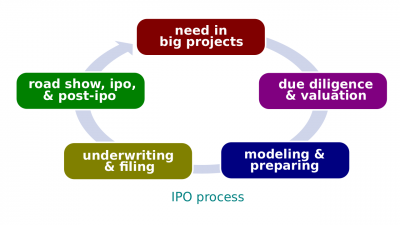Difference between revisions of "Initial public offering"
| Line 5: | Line 5: | ||
According to [[Financial Management Theory and Practice by Eugene F. Brigham and Michael C. Ehrhardt (13th edition)]], | According to [[Financial Management Theory and Practice by Eugene F. Brigham and Michael C. Ehrhardt (13th edition)]], | ||
:[[Initial public offering]] (''IPO''). Occurs when a closely held corporation or its principal stockholders sell stock to the public at large. | :[[Initial public offering]] (''IPO''). Occurs when a closely held corporation or its principal stockholders sell stock to the public at large. | ||
| − | + | According to [[Principles of Economics by Timothy Taylor (3rd edition)]], | |
| + | :[[Initial public offering]] (IPO). When a firm first sells shares of stock to outside investors. | ||
==Related concepts== | ==Related concepts== | ||
*[[Financial management]]. A combination of [[enterprise effort]]s undertaken in order to procure and utilize monetary resources of the [[enterprise]]. | *[[Financial management]]. A combination of [[enterprise effort]]s undertaken in order to procure and utilize monetary resources of the [[enterprise]]. | ||
Revision as of 07:59, 2 June 2020
Initial public offering (better known by its acronym, IPO) is a phenomenon that occurs when a closely held corporation or its principal stockholders sell stock to the public at large.
Definitions
According to Financial Management Theory and Practice by Eugene F. Brigham and Michael C. Ehrhardt (13th edition),
- Initial public offering (IPO). Occurs when a closely held corporation or its principal stockholders sell stock to the public at large.
According to Principles of Economics by Timothy Taylor (3rd edition),
- Initial public offering (IPO). When a firm first sells shares of stock to outside investors.
Related concepts
- Financial management. A combination of enterprise efforts undertaken in order to procure and utilize monetary resources of the enterprise.
